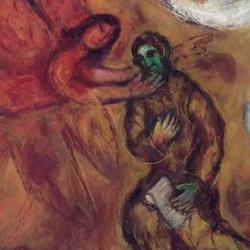Darrin Belousek ( Atonement, Justice, and Peace: The Message of the Cross and the Mission of the Church ) gives a provocative reading of Isaiah 53’s Suffering Servant. He argues that the passage doesn’t teach a penal substitutionary view of the atonement. He isolates two issues: First, he claims that the Servant does not suffer instead of the people but along with them. Since “the penal substitution view . . . claims that the people do not suffer for their sins but are spared the suffering they deserve,” Isaiah 53 is not “an example of penal substitution” (230).
Second, the penal substitution view assumes that the “our” suffering is still future and that the Servant’s suffering ensures that the judgment from coming (230-1). So, for instance, one might say that Jesus as the Servant suffers on the cross so that we will not suffer the future judgment of eternal punishment.
Belousek concludes, with Morna Hooker, that the Servant doesn’t suffer by an “exclusive place-taking” but by “inclusive place-taking,” which is “representational” rather than “substitutionary.”
I find this unconvincing on two points.
First, the account of penal substitution seems to be a very narrow one. It seems possible to have a penal substitution view that goes something like this: The people are suffering the just judgment for their sins; the Servant comes alongside and shares that judgment; by sharing that suffering, He draws their suffering to Himself, so that, while He doesn’t remove all the consequences of the people’s sins (they suffer the consequences of sin, including death) He bears and removes the final consequence, eternal death. I’m not claiming this is the point of Isaiah 53, only suggesting that penal substitution need not be “exclusively exclusive.”
Second, and more importantly, there seems to be a sleight of hand in Belousek’s account of the Servant’s co-suffering. He rightly notes that in Isaiah 53, “‘our’ suffering is both a due judgment and a present reality” (231). Zion is bereft and her children in exile; whatever the Servant does, He won’t deliver her from all her suffering, because she is already suffering. The “we” of Isaiah 53 deserves to suffer because of “our” sins, but the Servant is sinless and thus suffers without guilt. Guilt is exclusively ours, but suffering is shared: “‘we’ and ‘he’ are both suffering’ but only ‘we’ deserve it” (231).
That’s all plausible. What’s less clear is how this escapes what Belousek wants to escape, namely, the conclusion that God punishes the innocent Servant. Here’s where the sleight of hand seems to come in: The people (“we” in Isaiah 53) suffer because of God’s judgment against their sins. The Servant enters into their suffering, which must mean that the Servant comes under the judgment of God – since that’s the cause of the suffering in the first place. Belousek says that “the people do suffer exile for their own sins, which reveals God’s judgment upon his people” (231), but if that’s true, and if the Servant shares the curse of exile, doesn’t that mean he also comes under “God’s judgment upon his people.” And if the Servant is Jesus, then Jesus’ sym-pathe with sinful human beings necessarily means that He enters under the judgment of God.
Perhaps Belousek is satisfied with loosening the connection between God’s judgment and the Servant’s suffering. In his view, God doesn’t beat the innocent Servant while the people look on from a distance; in His view, God doesn’t exhaust His wrath exclusively on the Substitute. God judges the Servant indirectly, insofar as the Servant willingly enters into the curse that God has placed on the people. Still, it’s important to see that Belousek doesn’t eliminate the penal element from the picture.














